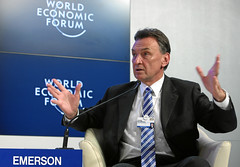ASIA
26 March 2014
Australia's Emerson on the Asian Century
Craig Emerson, Australia's Minister for Trade and Competitiveness, recently unveiled some of the thoughts in the Australian government's forthcoming White Paper on Australia in the Asian Century.
In an interesting speech to the Sydney Institute last week, Craig Emerson, Australia's Minister for Trade and Competitiveness, unveiled some of the thoughts in the Australian government's forthcoming White Paper on Australia in the Asian Century.
As Prime Minister Gillard said to a conference in New York, the “White Paper” is designed to be "a national blueprint for a time of national change – designed to set ambitious national goals for lifting the Asia capabilities of the Australian Government and people".
Emerson remarked that one characteristic of East Asia's development has been the creation of production supply chains or value chains. Different countries contribute to different parts of the production process, according to its comparative advantage. For example, the i-Phone was invented in the US, one of the world's most innovative countries. Its high-tech components are manufactured in the advanced economies of Germany, Japan and Korea. And the low-cost, labor-intensive stage of assembly is completed in China -- but by a Taiwanese company.
One striking thing to Emerson is that Australia's participation in these supply chains is very low. Australia's manufacturers should aim to find a niche in these supply chains. They need to change their mindset about manufacturing supply chains. Emerson also highlighted the potential of Australia's services sector to participate in supply chains.
Thus, under Emerson's leadership, Austrade, Australia's trade promotion outfit, is now re-orienting its activities to target these supply chains. And it is proposed that Australia's Export Finance and Insurance Corporation (EFIC) should also re-orient its activities in this way.
Emerson is spot on his analysis of this issue. Australia has for too long attempted to manufacture things like motor vehicles, under heavy and expensive protection, for which it has no comparative advantage.
In response to a question from the floor regarding Australia's geographic distance from East Asia's supply chains, Emerson noted that we are all in the same broad time zone, that there are well established networks through migrants and Asian students in Australia, and that Australia's good governance, rule of law and corruption-free environment are a big plus in the eyes of Asian business.
In terms of diversifying Australia's Asian export markets, Emerson emphasized the potential of working with regional governments in China and India, and cited the example of his taking a delegation of Australian business to the Western provinces of China. A lot of action is happening in the regions. He also stressed the potential of some countries which are off the beaten track, like Burma, Kazakhstan and Mongolia.
And lastly, he reminded the audience that despite the flurry of activity in the mining sector, Australia's agricultural potential is enormous. Food demand will be driven by a world population growing from 7 to 9.3 billion by 2050, and the appetite of Asia's growing middle class for better diets.
All in all, there seems to be a lot of thought going into the Australian government's reflections on the Asian Century.
Executive Director
Asian Century Institute
www.asiancenturyinstitute.com
As Prime Minister Gillard said to a conference in New York, the “White Paper” is designed to be "a national blueprint for a time of national change – designed to set ambitious national goals for lifting the Asia capabilities of the Australian Government and people".
Emerson remarked that one characteristic of East Asia's development has been the creation of production supply chains or value chains. Different countries contribute to different parts of the production process, according to its comparative advantage. For example, the i-Phone was invented in the US, one of the world's most innovative countries. Its high-tech components are manufactured in the advanced economies of Germany, Japan and Korea. And the low-cost, labor-intensive stage of assembly is completed in China -- but by a Taiwanese company.
One striking thing to Emerson is that Australia's participation in these supply chains is very low. Australia's manufacturers should aim to find a niche in these supply chains. They need to change their mindset about manufacturing supply chains. Emerson also highlighted the potential of Australia's services sector to participate in supply chains.
Thus, under Emerson's leadership, Austrade, Australia's trade promotion outfit, is now re-orienting its activities to target these supply chains. And it is proposed that Australia's Export Finance and Insurance Corporation (EFIC) should also re-orient its activities in this way.
Emerson is spot on his analysis of this issue. Australia has for too long attempted to manufacture things like motor vehicles, under heavy and expensive protection, for which it has no comparative advantage.
In response to a question from the floor regarding Australia's geographic distance from East Asia's supply chains, Emerson noted that we are all in the same broad time zone, that there are well established networks through migrants and Asian students in Australia, and that Australia's good governance, rule of law and corruption-free environment are a big plus in the eyes of Asian business.
In terms of diversifying Australia's Asian export markets, Emerson emphasized the potential of working with regional governments in China and India, and cited the example of his taking a delegation of Australian business to the Western provinces of China. A lot of action is happening in the regions. He also stressed the potential of some countries which are off the beaten track, like Burma, Kazakhstan and Mongolia.
And lastly, he reminded the audience that despite the flurry of activity in the mining sector, Australia's agricultural potential is enormous. Food demand will be driven by a world population growing from 7 to 9.3 billion by 2050, and the appetite of Asia's growing middle class for better diets.
All in all, there seems to be a lot of thought going into the Australian government's reflections on the Asian Century.
Author
John WestExecutive Director
Asian Century Institute
www.asiancenturyinstitute.com




